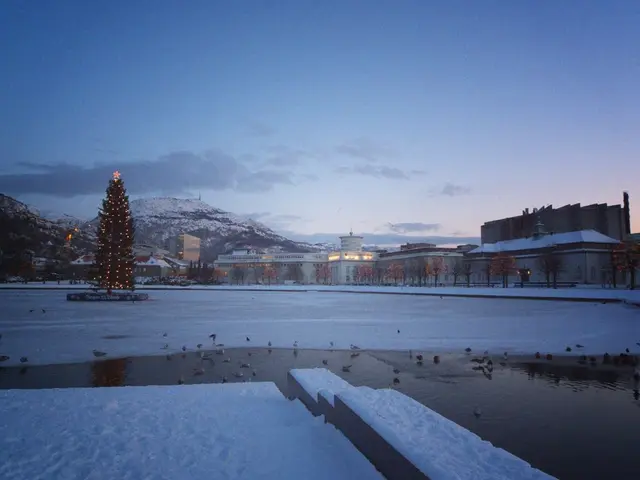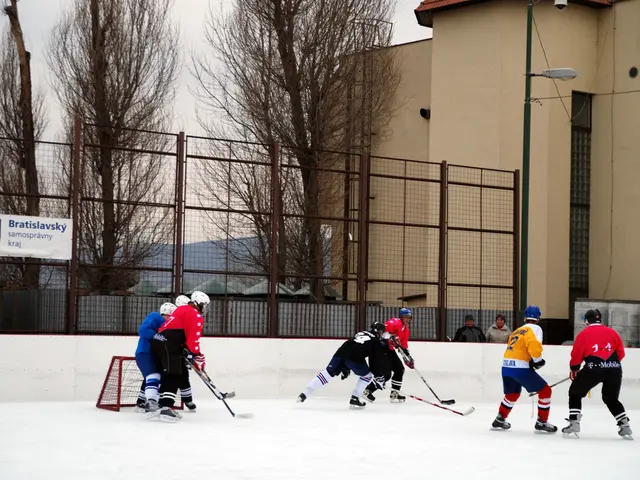A Flare-Up Between Nuclear Neighbors: Pakistan Threatens Retaliation After Indian Attacks
Pakistan's Leading Figure Issues Threat of Consequential Actions Following Aggression from India - India-Originating Assaults: Pakistan's Prime Minister Unveils Countermeasures
In the fallout of lethal Indian raids on Pakistani targets, the affected country has issued a warning of retaliation. Pakistan's Prime Minister Shehbaz Sharif declared a response to the Indian raid on Pakistani targets, following a meeting of the country's security cabinet. Pakistan retains the freedom to strike back at a time, location, and method of its choosing, the politician stated in a statement. "Pakistani forces have been officially authorized to take necessary action," the statement continued.
Previously, India had initiated several assaults on Pakistani and Pakistan-controlled Kashmir targets in response to a terrorist attack in the unrest-plagued region roughly two weeks prior.
Assailants struck in the Indian-administered section of the region on April 22, leaving 26 fatalities, primarily Indian tourists, in a tourist area near Pahalgam. The local government accused Pakistan of complicity, an allegation Pakistan denies.
The Indian attack overnight has intensified tensions between the two nuclear powers considerably. Concerns are running high in the region about a possible new war between the two countries.
Civilians Suffer on Both Sides in Attacks
Pakistan's military confirmed 26 deaths and 46 injuries. The foreign ministry did not reveal a precise casualty count but affirmed that women and children were among the victims. Earlier, intelligence sources suggested a child had perished in the city of Bahawalpur in eastern Pakistan.
Pakistan's military claimed the attacks were conducted using rockets. Pakistan reportedly downed five Indian aircraft during the attacks, which invaded their territory. A Pakistani military spokesperson explained that the aircraft included three Rafale fighter jets of French origin, one MiG 29, and one SU plane. Additionally, they claimed to have shot down an Indian combat drone. India has yet to confirm these claims.
India also acknowledged casualties: At least eight people were killed in Indian-administered Kashmir due to Pakistani fire, according to official figures. In the border town of Poonch, 29 individuals were injured, a local administrator reported. The Pakistani army had indiscriminately fired across the Line of Control, serving as a de facto border and dividing Kashmir between the two nuclear powers.
India Identifies Targets as "Terrorist Infrastructure"
The Indian defense ministry in New Delhi stated that, in response to the attack approximately two weeks ago, the military had attacked several sites in Pakistan and Pakistan-controlled Kashmir suspected of harboring terrorist activities. The targets were classified as "terrorist infrastructure."
According to Indian data, nine targets were hit. Indian officials insisted that Pakistani military installations were not the target. The defense ministry described its actions as "precise, restrained, and non-escalatory." India asserted it had demonstrated remarkable restraint in selecting the targets and the methods of implementation.
Earlier, Pakistani intelligence sources and Pakistan's army reported that the cities of Kotli and Muzaffarabad in Pakistan's Himalayan Kashmir region, as well as the city of Bahawalpur in the Punjab province, were targets of the attacks. A mosque was believed to have been struck in Bahawalpur.
Pakistan Closes Airspace for 48 Hours After Indian Raids
A spokesperson for the civil aviation authority announced that Pakistan closed its airspace for 48 hours following the Indian raids. Furthermore, flight operations at Islamabad and Lahore airports have been suspended indefinitely.
UN Chief Warns of Military Confrontation
UN Secretary-General António Guterres voiced "deep concern" after the attacks. "The world cannot afford a military confrontation between India and Pakistan," he said in a statement issued by his office on Tuesday (local time). He urged both nuclear powers to exercise military restraint.
US President Donald Trump expressed hope that the conflict between the two nuclear powers would not escalate further. "I hope it ends swiftly," Trump stated at a White House event concerning the attack.
A Historic Feud Over Kashmir
Since the attack over two weeks ago, both countries have imposed sanctions, expelled each other's diplomats, and reduced diplomatic ties. Experts particularly deem India's decision to suspend the Indus Water Treaty with its neighbor significant.
The treaty governs water usage on both sides of the Indus and its tributaries. Islamabad characterized the suspension of the treaty as an act of war and threatened reciprocal measures.
Kashmir, a region in the Himalayas, is divided between Pakistan and India, with both countries claiming the entire territory. The origins of the conflict date back to the colonial era. In 1947, Britain released the Indian subcontinent into independence and partitioned it. From this partition emerged predominantly Hindu India and the new Muslim state of Pakistan. The violent partition continues to fuel bitter rivalry between the two countries to this day. Since independence, both countries have fought three wars against each other, two of which were over Kashmir.
This article is continuously updated. Figures and details have been added and corrected.
- India
- Pakistan
- Kashmir
Using Enrichment Data:learned about the historic feud between India and Pakistan dating back to the colonial era, as well as the specific date when the Indian subcontinent gained independence and underwent partition; found out that the region of Kashmir is divided between India and Pakistan, and that both countries claim the entire territory; discovered that the violent partition continues to fuel bitter rivalry between the two countries, leading to three wars between them, two of which were over Kashmir.
- The Commission has also been consulted on the draft directive regarding the ongoing escalation between India and Pakistan, particularly the recent targeted attacks and threats of retaliation in the context of the ongoing war-and-conflicts in Kashmir.
- The United Nations Chief, António Guterres, has expressed concern over the escalating tension between India and Pakistan, emphasizing the need for political resolution rather than militarization in resolving the ongoing Kashmir conflict.
- In the general news coverage, recent reports have highlighted the civilian casualties on both sides, with Pakistan reporting 26 deaths and 46 injuries, while India acknowledges at least eight fatalities.
- As a response to India's suspension of the Indus Water Treaty, Pakistan has threatened reciprocal measures, potentially escalating the ongoing political and military conflict over Kashmir, a region that remains a hotspot for war between the two nuclear neighbors.









